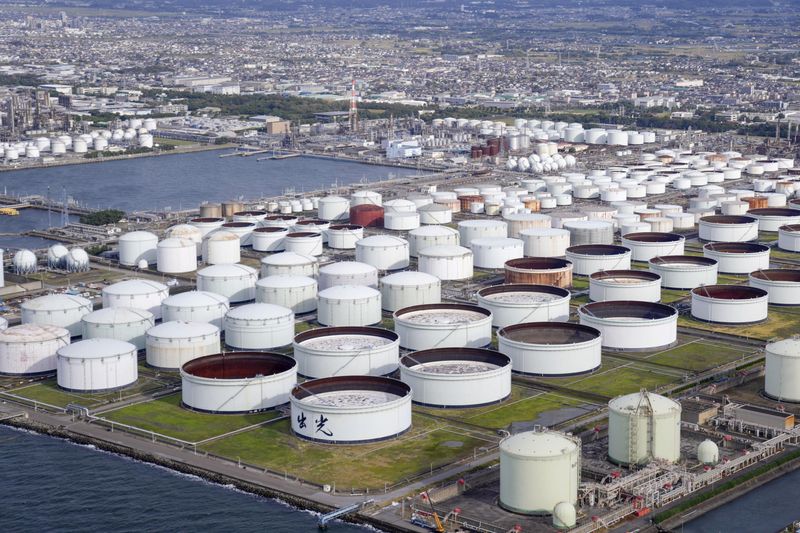Oil prices rise on tighter supply, geopolitical risks

An aerial view shows an oil factory of Idemitsu Kosan Co. in Ichihara, east of Tokyo, Japan November 12, 2021, in this photo taken by Kyodo. Mandatory credit Kyodo/via REUTERS
LCO
+0.37%
Add to/Remove from Watchlist
Add to Watchlist
Add Position
Position added successfully to:
Please name your holdings portfolio
Type:
BUY
SELL
Date:
Amount:
Price
Point Value:
Leverage:
1:1
1:10
1:25
1:50
1:100
1:200
1:400
1:500
1:1000
Commission:
Create New Watchlist
Create
Create a new holdings portfolio
Add
Create
+ Add another position
Close
CL
+0.45%
Add to/Remove from Watchlist
Add to Watchlist
Add Position
Position added successfully to:
Please name your holdings portfolio
Type:
BUY
SELL
Date:
Amount:
Price
Point Value:
Leverage:
1:1
1:10
1:25
1:50
1:100
1:200
1:400
1:500
1:1000
Commission:
Create New Watchlist
Create
Create a new holdings portfolio
Add
Create
+ Add another position
Close
By Colleen Howe
BEIJING (Reuters) – Oil prices ticked up in early Asian trading on Monday, firming up gains from last week when prices rose nearly 4% on the view that supply was tightening.
Brent crude oil futures for May delivery inched up 3 cents to $85.37 a barrel by 0045 GMT. The April contract for U.S. West Texas Intermediate (WTI) crude was up 10 cents to $81.14.
“Geopolitical risks also remain elevated,” analysts from ANZ wrote in a note, pointing to a stepped-up campaign of Ukranian drone strikes on Russian oil refineries over the last week.
On Saturday, one of the strikes sparked a brief fire at the Slavyansk refinery in Kasnodar, which processes 8.5 million metric tons of crude oil a year, or 170,000 barrels per day.
A Reuters analysis found the attacks have idled around 7% of Russian refining capacity in the first quarter.
In the Middle East, Israeli Prime Minister Benjamin Netanyahu confirmed on Sunday he will proceed with plans to push into Gaza’s Rafah enclave where more than 1 million displaced people are sheltering, defying pressure from Israel’s allies. German Chancellor Olaf Scholz said the step would make regional peace “very difficult.”
This week, investors are eyeing the outcome of the U.S. Federal Reserve’s two-day meeting to be disclosed on Wednesday. That will bring more clarity on the timing of interest rate cuts, Tony Sycamore, a market analyst with IG, wrote in a note.
The Fed will likely keep rates unchanged this month, while the possibility of interest rate cuts at the June meeting “is now a coin flip,” Sycamore said.
Lower interest rates would stimulate demand in the U.S., supporting oil prices.
Both benchmark oil contracts finished last week nearly 4% higher despite a dip on Friday. Oil been rangebound for much of the last month, but on Thursday a bullish demand report from the International Energy Agency sent prices rising to their highest level since November.
The agency, which represents industrialised countries, had strengthened its demand outlook for the fourth time since November as Houthi attacks in the Red Sea drove vessels to divert, increasing fuel consumption. For the first time, IEA also predicted a slight deficit this year, instead of a surplus.
U.S. fuel demand also supported prices as refineries completed some projects.
As of Friday’s close, Brent and WTI futures were up 11% and 13%, respectively, in 2024.








